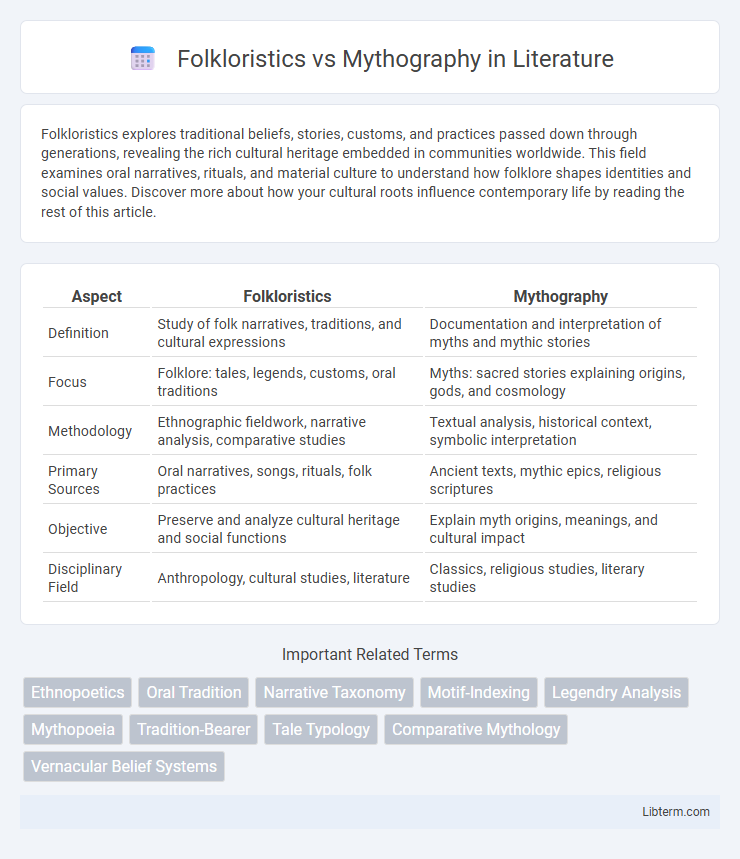Folkloristics explores traditional beliefs, stories, customs, and practices passed down through generations, revealing the rich cultural heritage embedded in communities worldwide. This field examines oral narratives, rituals, and material culture to understand how folklore shapes identities and social values. Discover more about how your cultural roots influence contemporary life by reading the rest of this article.
Table of Comparison
| Aspect | Folkloristics | Mythography |
|---|---|---|
| Definition | Study of folk narratives, traditions, and cultural expressions | Documentation and interpretation of myths and mythic stories |
| Focus | Folklore: tales, legends, customs, oral traditions | Myths: sacred stories explaining origins, gods, and cosmology |
| Methodology | Ethnographic fieldwork, narrative analysis, comparative studies | Textual analysis, historical context, symbolic interpretation |
| Primary Sources | Oral narratives, songs, rituals, folk practices | Ancient texts, mythic epics, religious scriptures |
| Objective | Preserve and analyze cultural heritage and social functions | Explain myth origins, meanings, and cultural impact |
| Disciplinary Field | Anthropology, cultural studies, literature | Classics, religious studies, literary studies |
Defining Folkloristics: Scope and Focus
Folkloristics encompasses the systematic study of traditional beliefs, customs, stories, and practices within cultural communities, emphasizing oral transmission and everyday social life. It investigates diverse forms of folklore including myths, legends, folktales, music, rituals, and material culture, analyzing their functions and variations across time and regions. Unlike mythography, which primarily documents and interprets myths as literary or religious texts, folkloristics adopts an interdisciplinary approach grounded in anthropology, ethnology, and cultural history, exploring the broader cultural and social contexts of folklore.
What is Mythography? An Overview
Mythography is the systematic study and compilation of myths, focusing on their narratives, functions, and variations within cultures. It examines mythic stories as texts, analyzing themes, symbolism, and their impact on cultural identity and belief systems. Distinct from folkloristics, which broadly explores oral traditions and folklore, mythography centers specifically on the documentation and interpretation of mythological content.
Historical Development of Folkloristics
Folkloristics emerged in the 19th century as a systematic discipline dedicated to collecting, analyzing, and interpreting oral traditions, folk tales, and cultural practices, distinct from the literary focus of mythography which centers on written myths. Early folklorists like the Brothers Grimm pioneered methodologies that emphasized the historical and cultural contexts of folklore, laying the foundation for modern ethnographic and comparative studies. The historical development of folkloristics reflects a shift from romantic nationalism toward interdisciplinary approaches, integrating anthropology, linguistics, and cultural history.
Evolution of Mythography as a Discipline
Mythography has evolved from a mere collection of myths to a structured discipline that analyzes narrative patterns, cultural contexts, and symbolic meanings, distinguishing itself from folkloristics, which broadly studies oral traditions and folk customs. The evolution of mythography involves integrating interdisciplinary approaches, including anthropology, literature, and history, to interpret myths beyond their narrative content and explore their roles in shaping societal values and identities. This progression reflects a shift towards understanding myths as dynamic, living texts that contribute to cultural continuity and transformation.
Methods and Approaches in Folkloristics
Folkloristics employs ethnographic fieldwork, participant observation, and comparative analysis to collect and interpret oral traditions, customs, and cultural expressions, emphasizing context and variation within living communities. Unlike mythography, which often documents and analyzes myths as literary texts, folkloristics prioritizes dynamic, performance-based methods that capture the transmission and transformation of folklore in everyday social settings. This approach integrates interdisciplinary tools from anthropology, linguistics, and history to understand folklore's function and meaning in cultural identity and social processes.
Techniques and Analysis in Mythography
Techniques in mythography emphasize the collection and systematic documentation of myths, often prioritizing narrative structure and symbolic content to preserve cultural heritage. Analytical methods focus on interpreting mythic motifs, examining thematic patterns, and exploring the socio-cultural functions of myths within communities. Folkloristics, by contrast, integrates broader ethnographic methodologies and performance analysis to study oral traditions beyond textual myths.
Key Differences Between Folkloristics and Mythography
Folkloristics focuses on the systematic study of folk traditions, narratives, and cultural expressions within specific communities, emphasizing the transmission and variations of oral literature. Mythography centers on the compilation and interpretation of myths, often aiming to document and analyze mythological stories and their symbolic meanings across cultures. Key differences include folkloristics' emphasis on cultural context and dynamic storytelling processes, while mythography prioritizes the thematic structure and mythic content.
Overlapping Areas: Where Folkloristics Meets Mythography
Folkloristics and mythography overlap in their examination of traditional narratives, with both fields analyzing myths, legends, and folklore motifs to understand cultural values and societal norms. Folkloristics emphasizes the transmission, variation, and performance of oral traditions, while mythography concentrates on the organization, interpretation, and compilation of mythic texts. The intersection arises in the study of myth as a folkloric form and in exploring how mythological stories are adapted, preserved, and function within living communities.
Case Studies: Comparative Examples
Case studies in folkloristics and mythography reveal distinct approaches to cultural narratives, with folkloristics emphasizing oral traditions and social contexts, while mythography focuses on the documentation and analysis of mythic themes and symbols. Comparative examples such as the analysis of Greek myths in mythography versus the collection of local folktales in Balkan folkloristics illustrate how these disciplines interpret narrative structures differently, highlighting variations in cultural transmission and function. Studies like the examination of Native American creation stories demonstrate how folkloristics explores community identity and performance, whereas mythography categorizes myth elements for thematic coherence.
Contemporary Relevance: Folkloristics vs. Mythography
Contemporary folkloristics emphasizes the dynamic, living traditions of communities, analyzing how folklore adapts within social contexts and digital environments to reflect cultural identity and collective memory. Mythography focuses on the systematic documentation and interpretation of myths, providing insight into ancient narratives and their symbolic meanings across civilizations. Both fields contribute to understanding cultural heritage, with folkloristics highlighting evolving popular expressions and mythography preserving foundational mythic structures.
Folkloristics Infographic

 libterm.com
libterm.com